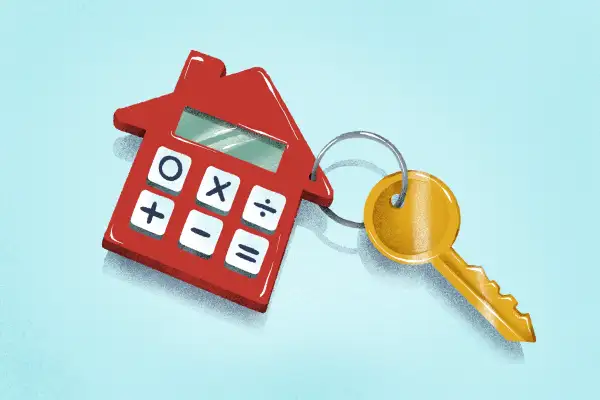Mortgage Refinance Calculator

With mortgage rates hitting new record lows over twelve times, millions of people have already refinanced their mortgages and millions more could save by doing so.
Use Money’s refinance calculator to determine whether refinancing is right for you.
How Money’s Refinance Calculator Works
To give you an estimate of how much you could save by refinancing, our calculator allows you to enter details about your current mortgage and your new home loan.
While our calculator can give you an idea of your potential refinance savings, you’ll still have to do legwork to find your loan. According to Freddie Mac, borrowers who get at least five rate quotes can save about $1,435 on a $250,000 loan by getting one additional quote.
Since lenders offer different rates based on your location, credit score, loan amount and type, etc., shopping around is a surefire way to save on your mortgage refinance.
If you don’t know where to start, check out our research on the Best Mortgage Lenders of 2020.
Mortgage Interest Rates in 2021
The ongoing COVID-19 pandemic has caused rates to drop nearly a full percentage point since the end of 2019, leading to a surge in mortgage refinance applications.
If you’re waiting to see if rates will drop lower, remember that it’s impossible to time the market. Everything, from the results of the 2020 presidential election to the prospect of a COVID vaccine, has impacted interest rates.
Instead of gambling on what may happen tomorrow, think about how refinancing could benefit your current mortgage situation. If you’re ready to take the plunge, take advantage of the low interest rate environment today by comparing offers from different lenders.
You may want to opt for a rate lock with a float down option if you’re afraid to miss out on additional savings. That way, if interest rates increased, you’d still get the rate you were originally quoted, but if they drop any lower while your loan is being processed, you’d get the lowest possible rate. Float downs can cost as much as 1% of the loan amount, so do the math to make sure it will pay off.
Should I Refinance my Mortgage in 2021?
Depending on your needs, refinancing could make sense if it can achieve one of five things:
Lower your monthly payment
In general, this move makes the most sense if you can lower your rate by at least one percentage point. To qualify for the lowest possible interest rate, you’ll generally need to have a credit score of at least 740.
Switch to a fixed-rate mortgage from an adjustable-rate mortgage
With a fixed-rate mortgage, your interest rate and monthly mortgage payments will remain the same for the life of the loan (i.e. until you sell, refinance or finish paying). Due to that predictability, fixed-rate mortgages are the best option for most borrowers — especially when rates are low and if they plan to stay in their home for a long time.
Get out of debt faster
While spreading your loan balance over a shorter loan term will increase your monthly payments, you will pay your mortgage off faster, and pay less interest over the loan’s term. Rates are also generally lower for 15-year loans than for 30-years. This option is best for those who have few long-term financial obligations and, of course, earn enough on a monthly basis to cover the higher loan amount.
Obtain the cash you need now
Cash-out refinance loans may be harder to qualify for, as most banks will require you to keep at least 20% equity in the home and to have a higher credit score. Interest rates on cash-out refinance loans also tend to be higher. Most borrowers opt for this type of refinancing to cover home renovation expenses or to consolidate debt.
Get Out of Paying Mortgage Insurance
On conventional loans, private mortgage insurance (PMI) should be automatically canceled once you’ve reached 80% equity in your home. However, with an FHA loan, you are required to pay mortgage insurance premiums (MIP) for the life of the loan. If you have enough equity and can qualify, it can pay to refinance to a conventional loan. The FHA mortgage insurance premium ranges from 0.45% to 1.05% of the loan amount each year.
When is Refinancing your Mortgage a Bad Idea?
Refinancing may not make sense in every scenario. If the cost of the new loan will exceed how much you’d save by refinancing, if your financial situation is uncertain, or if your credit score has taken a dip, refinancing may not be the smartest choice.
If You’re Planning to Move Soon
If you’re planning to sell in the next few years, what you save each month by refinancing may not exceed what it will cost you to refinance your loan.
To find out your new loan’s break-even point, add up the closing costs, which can include appraisal fees, title and credit report fees, and origination fees — around 1% of the loan amount — and divide them by the amount you’d be saving per month with the new payment.
According to Freddie Mac, the average closing costs on a mortgage refinance are around $5,000. If you’re planning to stay in the home for less time than it would take you to get back what you would spend on closing costs, refinancing may not be a good deal.
If Your Credit Score Has Gone Down
When you apply for a refinance loan, lenders determine your creditworthiness in part by looking at your credit score. The higher your credit score, the better your chances of snagging a low rate.
If your credit score is lower than it was when you bought your home, you may not qualify for as low a rate as you expect. If your score is low enough you may want to work on improving your credit before refinancing.
How do I Qualify for a Mortgage Refinance?
When applying for a new mortgage or refinance loan, there are three main factors that will impact your rates:
- debt-to-income ratio
- credit score
- loan-to-value ratio
Although credit score requirements will vary by lender and loan type, a higher score will always mean a better rate. If you feel your credit needs improvement, there are ways to gradually improve your score, such as checking your report for errors and getting them corrected. Check out all three free copies of your annual credit reports from annualcreditreport.com.
Ultimately, the best way to improve your score is to develop good long-term credit habits, like paying your bills on time and keeping tabs on your credit utilization rate. Being patient is important.
Understanding Each Field in our Mortgage Calculator
Why Are You Refinancing?
Part of what makes Money’s refinance calculator unique is that it asks you to input your goals for refinancing in the first place. Refinancing can:
- help you lower your monthly payment
- adjust your loan term
- or take cash out
However, refinancing generally cannot do all three at once. Consider your needs carefully and be aware that some refinance options may have more stringent qualification requirements than others.
Also note that your reason for refinancing will alter the information fields the calculator requires you to fill out, as well as the calculator’s output — your monthly savings and total savings.
Original Loan Amount
Refinancing entails replacing your current loan with a new mortgage featuring a new interest rate and loan term. Usually, that means simply carrying over your existing loan balance.
Borrowers who qualify can sometimes refinance to a larger loan amount, tapping the home equity they’ve built over time to take money out of their mortgage. This is called a cash-out refinance.
Month and Year of Origination
This is when you took out your original mortgage. If you’re well into your current mortgage and have built considerable equity in your home you may end up paying more interest in the long run by refinancing, even if your monthly payments are lower.
Original Loan Term
This is the set amount of time you’ll be paying the loan before you fully own the home (assuming you don’t make extra payments). The most common mortgage length in America is the 30-year term, though most lenders also offer options with 15-year terms and sometimes less.
Refinancing to a longer term means:
- Lower payments over a longer period of time
- Paying more interest over the life of the loan
Refinancing to a shorter term means:
- Higher monthly payments
- Lower total interest
Bear in mind that refinancing resets your loan term. If you take out another 30-year loan, you will be paying for it for the next 30 years (from the refinance date).
Original Interest Rate
This is the mortgage rate you’re currently paying on your original mortgage.
New Loan Type
The two main types of mortgages are conventional loans and government-backed loans.
Conventional loans
Aren’t insured by the federal government, are generally harder to qualify for, and can be conforming or non-conforming:
- Conforming loans meet the standards for purchase set by Fannie Mae and Freddie Mac, specifically regarding loan amount.
- Non-conforming loans, such as jumbo loans, exceed the loan limits set by Fannie and Freddie — $548,250 for single-family, one-unit properties in most of the U.S. as of 2021, but more expensive markets have higher limits.
Government-backed loans
Are neither conforming nor conventional. These loans are issued by banks but insured by one of three government agencies:
- the Federal Housing Administration (FHA)
- the US Department of Agriculture (USDA)
- the Department of Veteran Affairs (VA)
Since government-backed loans are insured by the federal government, they carry less risk for lenders, so they tend to feature lower interest rates and low or no down payment requirements. However, each of these loans has specific qualification requirements that apply to the home, the borrower, or both.
Adjustable or Fixed Rate
- Adjustable-rate mortgages (ARMs) - typically have lower interest rates than fixed-rate mortgages, but your monthly payments could fluctuate after the loan’s initial fixed-rate period.
- Fixed-rate mortgages tend to have higher interest rates and lower monthly payments, but you pay more interest over a longer loan term.
New Interest Rate
Money’s mortgage refinance calculator will auto-populate with an average mortgage rate based on the information you enter, but you can override this to see how rate changes could impact your costs.
Most experts recommend refinancing if you can lower your rate by a full percentage point — for example from 4% to 3%.
State
This field will automatically populate based on your IP address. However, you can override this setting by manually entering your zip code. Keep in mind that lenders offer different rates based on your home’s location, so these can vary based on your state and county.
Credit Rating
Your credit score is a key factor in determining your mortgage rate. While credit score requirements vary by lender and loan type, borrowers generally need scores of 740+ to qualify for the best rates. If your credit has improved since you took out your first mortgage, refinancing could help you get a lower interest rate.




